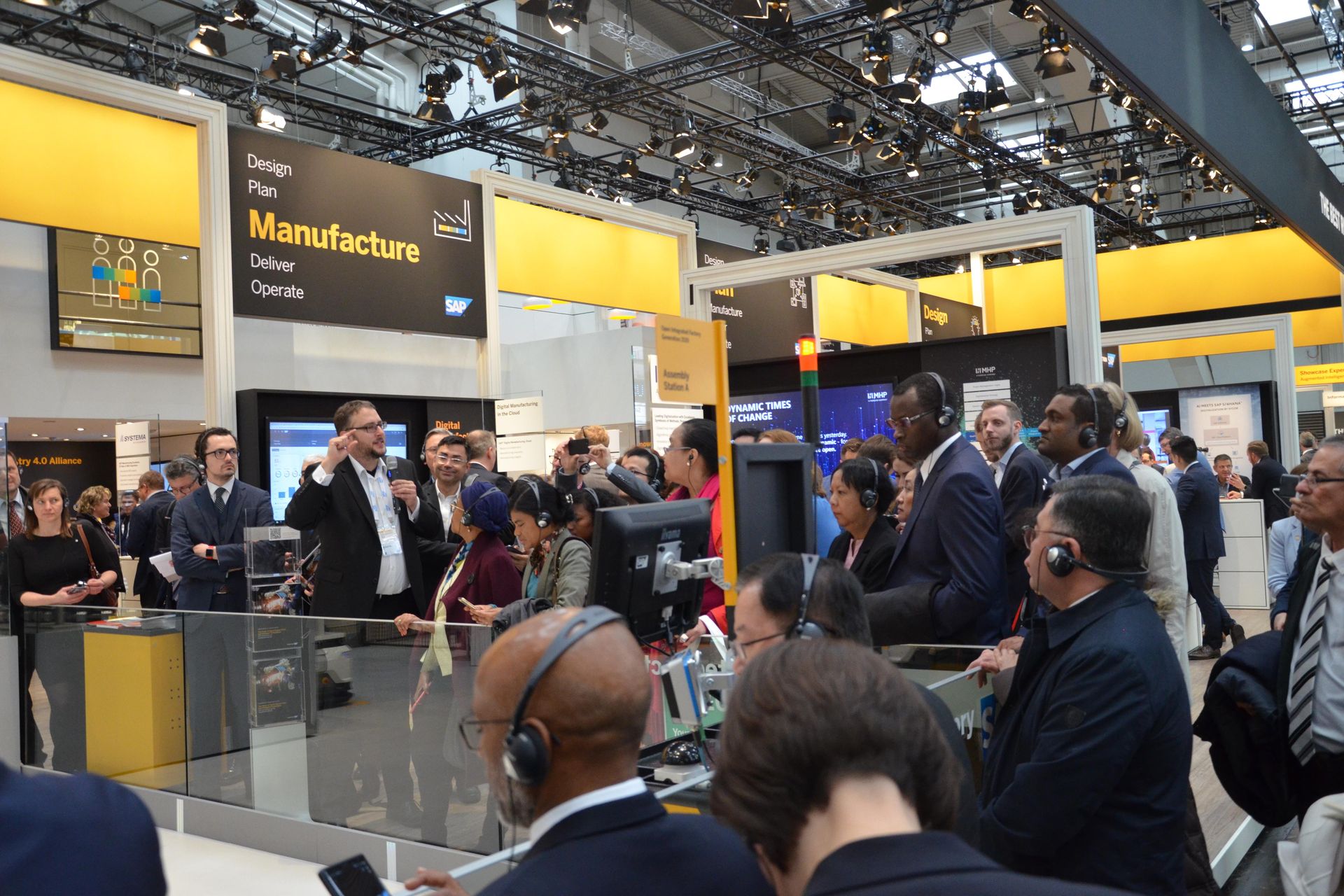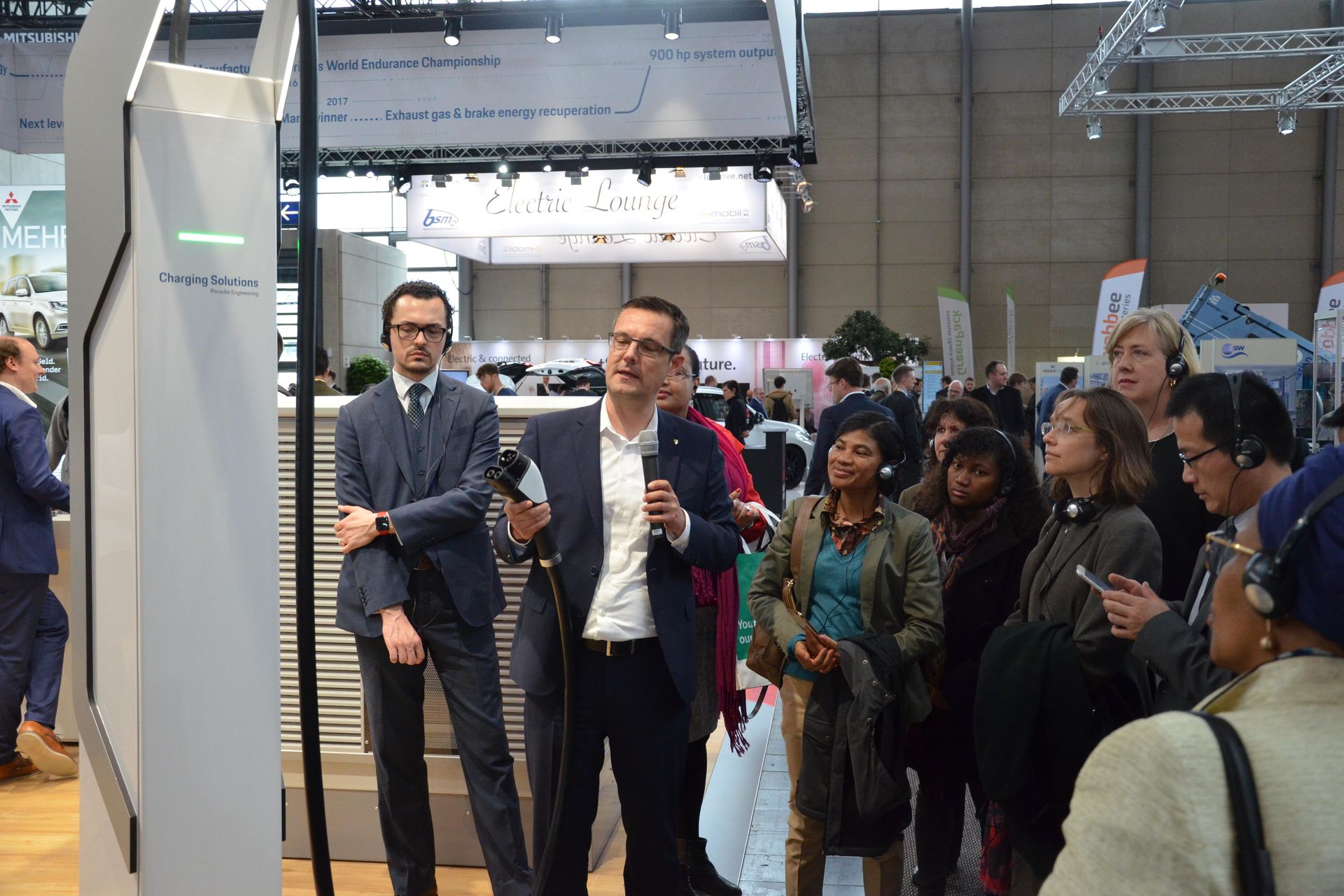This year, too, many diplomats were drawn to the capital of Lower Saxony to discover the latest trends and technologies in Industry 4.0 with their own eyes and ears. Under this year's motto "Integrated Industry - Industrial Intelligence" more than 6500 exhibitors from 75 countries presented themselves and their developments for five days, including established companies and innovative start-ups.
Once again, Deutsche Messe AG and the Federal Foreign Office had invited the members of the diplomatic corps to this year's Ambassadors' guided tour. They met on the huge exhibition grounds in the Hermes Lounge, where Wolfgang Lenarz, Senior Vice President Global Fairs, and Andrej Gross, Director Government Affairs, welcomed the guests on behalf of Deutsche Messe. On the part of the Federal Foreign Office, the "digital ambassador" Dr Hinrich Thölken welcomed the technophile diplomats. Claudia Grüne from Germany Trade & Invest (GTAI), the German Association for Foreign Trade and Location Marketing, gave a briefing on the tour. And then it all had started.






First Morals, then Research
Germany's AI strategy contains significant cultural aspects. Scientific research, the transfer of its results to the business world and the framework for a trustworthy, ethically justifiable use of artificial intelligence play a special role in the international competition of new technologies. After all, we are still at a relatively early stage of development. So it is not surprising that the first stop of the tour led to the booth of the German Research Center for Artificial Intelligence (DFKI). According to Professor Philipp Slusallek, Scientific Director at DFKI, the world-renowned DFKI primarily trains researchers and AI experts who develop methods to explain how complicated AI systems work. Slusallek is also co-initiator of CLAIRE (Confederation of Laboratories for Artificial Intelligence Research in Europe). The CLAIRE initiative was launched to improve the integration of European research institutions, bringing together stakeholders from research, industry, politics and society in Europe and involving them in the discussion of new research topics, technologies and solutions.
The Fraunhofer Institute for Intelligent Analysis and Information Systems (IAIS) also conducts intensive research in the field of artificial intelligence. Jens Lehmann – no, not the goalkeeper – is Lead Scientist at the IAIS and at the same time Professor of Data Engineering at the Institute for Computer Science at the University of Bonn. He presented voice-controlled dialogue systems for use in various areas of business and industry, such as automobile production. According to Lehmann, robots with language assistants can facilitate intuitive interaction between humans and machines with the help of machine learning and offer customers completely new services. At the Hannover Messe, the IAIS, in cooperation with Volkswagen, presented a first research prototype that can answer questions on specific areas of interest.






The Digital Factory
CEO Joe Kaeser personally accompanied the German Chancellor and the Swedish Prime Minister Stefan Löfven on the opening day of the fair on the impressive stand of Siemens. Now, the diplomat group was also able to get an idea of the range of solutions and products offered by the German technology group. With its "Digital Enterprise Solution Portfolio", Siemens connects the real and the virtual world. On site, Siemens creates digital twins, collects data, analyses them in the IoT platform "Mindsphere", plans, tracks, simulates, models anew, remotely controls industrial robots, produces 3D prints, revokes plans, collects new data - all at the same time, everything at an unimaginable speed of adaptation and flexibility. The fourth industrial revolution is both dizzying and absolutely fascinating. That's probably why people are now talking about digital ecosystems in industrial manufacturing.
A few halls down the road it suddenly hung there, the object of desire that many network providers in Germany are currently flirting with: the new 5G mobile communication standard. Networked production requires the processing of enormous amounts of data. Anyone who had to make do with one or two LTE bars in the morning on the train from Berlin to Hanover could now see a small white box with a 5G symbol at the SAP stand. Here in the "Open Integrated Factory", the technology was already working with low latency. In the software manufacturer's digital factory, mobile robots glided wirelessly from one assembly station to another, driven by several gigabits per second. Yes, the entire Hannover Messe site was a 5G test field this year thanks to Nokia and Qualcomm. Next year, the industry show is to become a "Smart Venue", the first 5G fairground in the world.






Young Wild Ones
At the end of the guided tour, the exhibitors of the Young Tech Enterprises met the diplomat delegation with a great deal of euphoria. In the exhibition area, young dynamic start-ups attract attention with their products and projects. The Belgian tech pioneer Arkite, for example, presented a novel operator guidance system called "Human Interface Mate". Using 3D object recognition technology, the software gives the employee live assembly instructions and orientation aids and warns him of manual errors. The Dutch start-up Senseglove impressed with its VR headset and data glove. The haptic blue plastic glove uses sensors to simulate the gripping of virtual objects. Nanowired, a company from the German town of Gernsheim, won this year's Hermes Award at the Hannover Messe. Forget gluing and soldering: with the "KlettWelding Tape" electronic components can be permanently and stably connected using environmentally friendly nanowires.
In the "Sweden Co-Lab" pavilion, the diplomats finally met the Swedish Ambassador H.E. Per Thöresson for a short chat. Sweden, whose trade fair appearance with 150 domestic exhibitors was characterised by cooperation and innovation, was this year's partner country of the self-proclaimed world's leading trade fair for industry. Subsequently, innovative solutions in the fields of automation, electrification, drive technology and robotics were presented by the Swedish company ABB. During the fair, ABB, together with Volvo, provided the visitors with emission-free shuttle buses. After visiting the booths of Bosch Rexroth (drive and control technologies) and Porsche Engineering (responsible for all development projects of the automobile manufacturer), the visitors returned to the Hermes Lounge with one of these noiseless vehicles.
China and the United States, but also India, Israel and Japan are currently investing billions in AI development. At the opening of the Hannover Messe, Chancellor Merkel therefore stressed that European answers were needed for future industrial policy. With the example of the Scandinavians and after the visit to Hanover, one thing can be said for sure: the strength lies in collaboration, no matter what.






TEXT Enrico Blasnik

